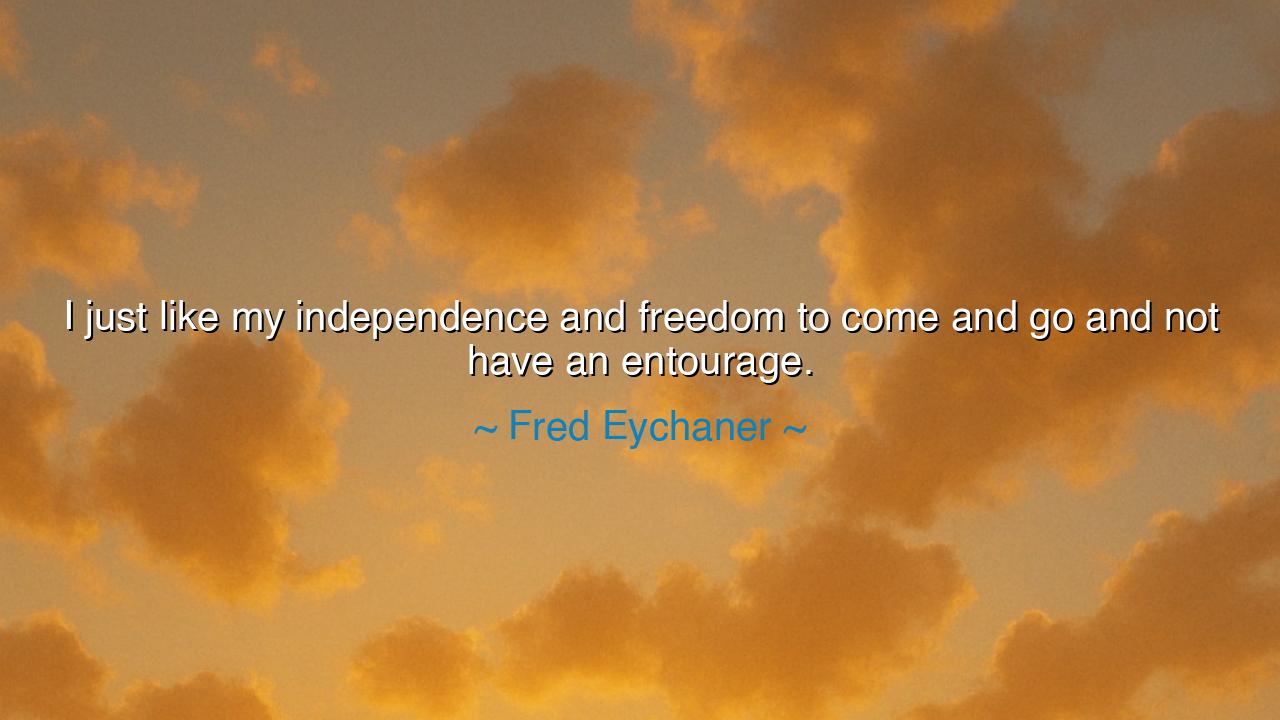
I just like my independence and freedom to come and go and not






“I just like my independence and freedom to come and go and not have an entourage.” Thus spoke Fred Eychaner, the quiet titan of philanthropy and publishing, whose influence has touched politics, culture, and the arts — yet who himself walks without fanfare. His words, simple though they seem, carry the weight of ancient wisdom: that true greatness does not cry out for attention, and true freedom does not parade in splendor. In an age that glorifies spectacle, his declaration is a hymn to humility — to the noble art of living independently, unchained by vanity and untouched by the noise of acclaim.
To understand his meaning, one must first see the life behind the words. Fred Eychaner has long been a figure of immense success and generosity, yet unlike many who dwell in wealth, he seeks the quiet path. In his saying, “I like my independence and freedom to come and go,” he speaks of the soul’s longing to move through the world unburdened — to live without the prison of image or expectation. The entourage, that ever-present symbol of power and importance, becomes here a metaphor for dependency — the invisible chains that bind those who have built their lives upon the approval of others. In rejecting it, Eychaner honors something sacred: the sovereignty of the self.
The ancients too revered this virtue. Diogenes the Cynic, who lived in a barrel and owned nothing but his lamp, once told Alexander the Great to “stand out of my sunlight.” The conqueror, astonished by his audacity, declared, “If I were not Alexander, I would wish to be Diogenes.” For Diogenes possessed something even kings desired — freedom. He owed allegiance to no man, no court, no crown. He was rich not in gold, but in independence, walking where he wished, speaking what he thought, and answering only to truth. In the same spirit, Eychaner’s words remind us that the truest power is not in commanding others, but in commanding oneself.
There is deep irony in the lives of those who rise high in worldly stature. Many ascend seeking freedom — freedom from want, from limitation, from obscurity — and yet, once at the summit, they find themselves surrounded, not liberated. Their movements are choreographed; their words are measured; their lives are no longer their own. The entourage, whether of courtiers in ancient palaces or admirers in modern fame, becomes a gilded cage. Eychaner’s rejection of it is thus a quiet act of rebellion, a restoration of ancient balance. Like the sages of old, he chooses the solitude of authenticity over the applause of the crowd.
In every era, there have been those who understood that solitude is not loneliness, but strength. The philosopher Seneca wrote that “the man who is truly great is the same in the crowd as when alone.” For him, as for Eychaner, independence was not isolation but harmony — the alignment of one’s life with one’s values, uncorrupted by the clamor of the world. In choosing to come and go freely, Eychaner embraces a life where each action springs from will, not obligation; where presence is a choice, not a performance. This is the essence of what the Stoics called autarkeia — self-sufficiency, the ability to be content and whole within oneself.
History offers another example in the life of George Washington, who, after leading a revolution and presiding over a nation’s birth, chose not to remain in power. Though the people would have crowned him a monarch, he longed only for the peace of his farm, to “come and go” beneath his own roof, beholden to none. In that choice, he proved that the measure of true greatness is not how long one holds power, but how easily one releases it. Eychaner’s words echo that same spirit — a refusal to be consumed by the very structures one has built, a devotion to freedom over fame.
And so, my child of ambition and reflection, learn from this wisdom of Fred Eychaner: guard your independence as you would your most precious treasure. Do not mistake visibility for value, or followers for freedom. Seek instead the life that allows you to move with lightness — where your steps are guided by purpose, not permission. Let your worth be measured not by how many walk behind you, but by how clearly you walk your own path.
For the world will always tempt you to surround yourself with noise — with praise, with followers, with endless obligations that masquerade as honor. But the soul grows quiet only in solitude, and the mind grows sharp only in freedom. Therefore, live as Eychaner lives: unbound, unguarded, and unafraid. Let your life be your own, your movements your choice, and your truth unshadowed by the company of pretense. For in this lies the rarest form of power — the power of true independence, which neither kings nor fame can buy, and which only the brave ever fully claim.






AAdministratorAdministrator
Welcome, honored guests. Please leave a comment, we will respond soon